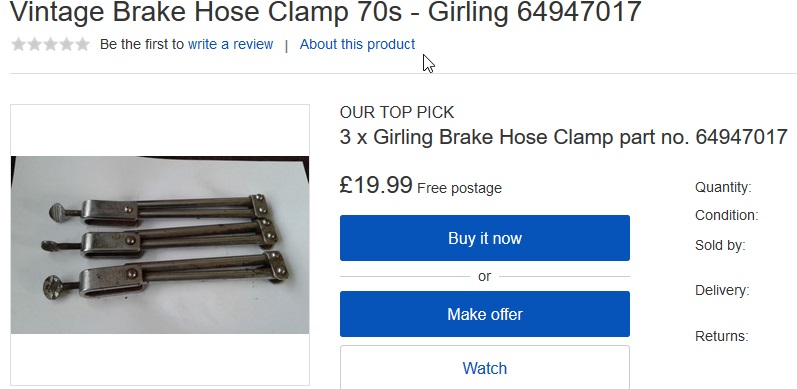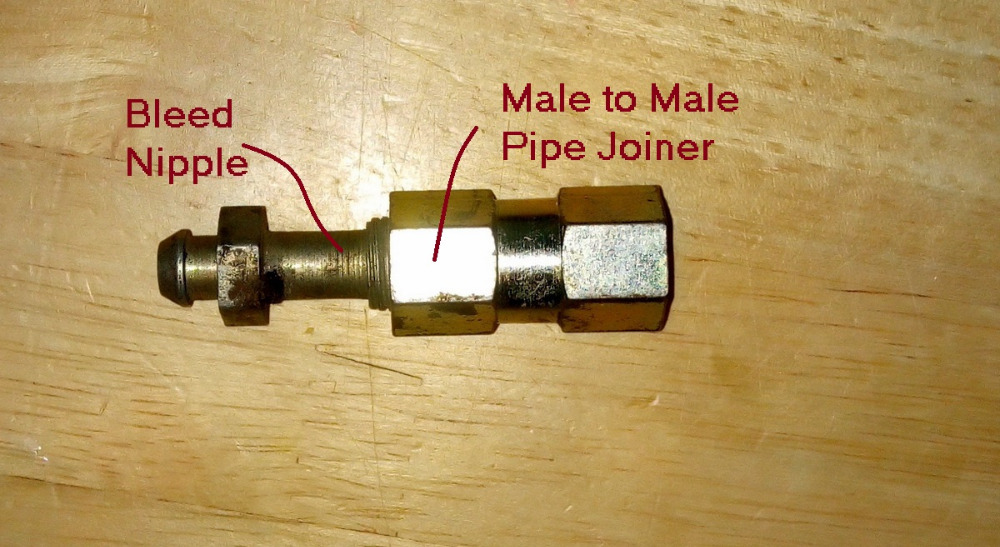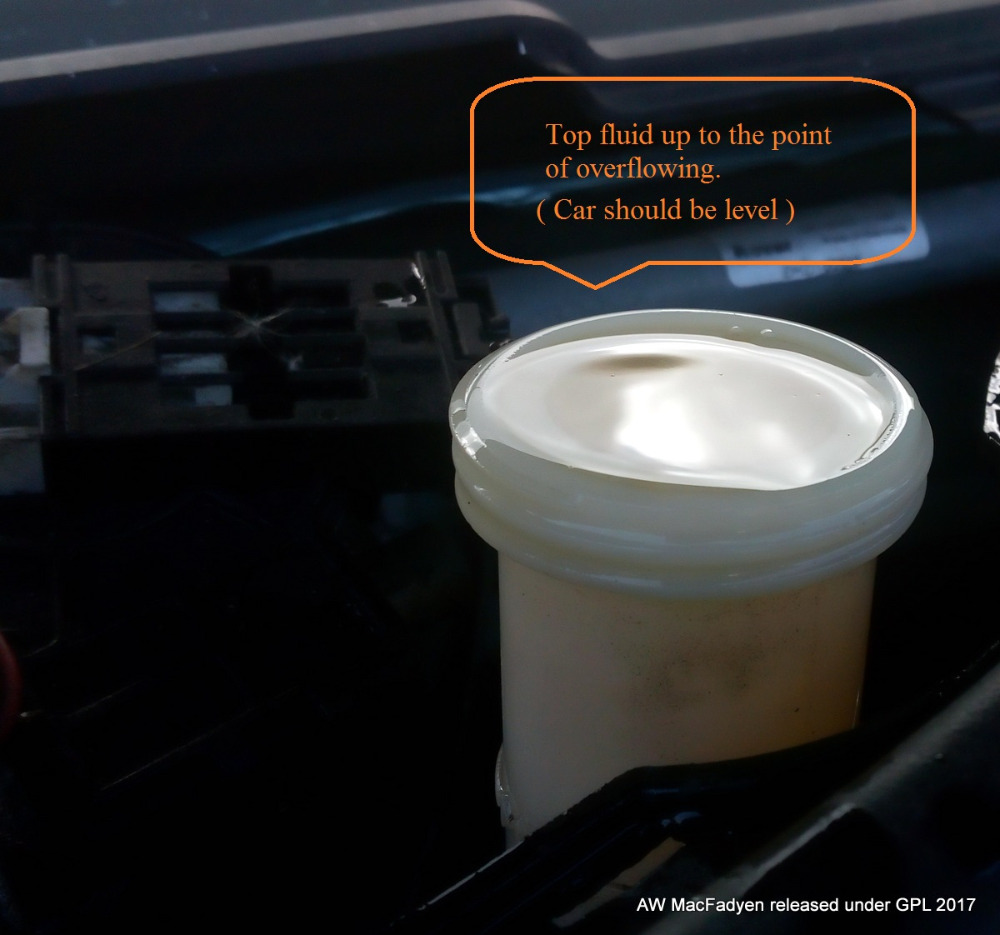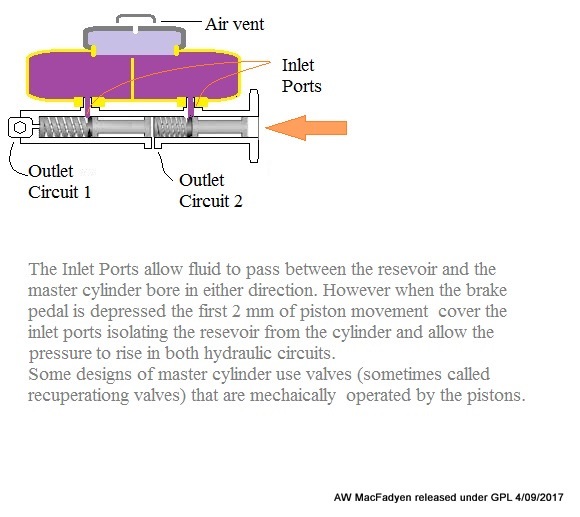Brake bleeding
- Charles Acosta
-
Topic Author
- Offline
- Senior Member
-

- Posts: 79
- Thank you received: 13
Please Log in or Create an account to join the conversation.
- Andy.MacFadyen
-

- Offline
- Moderator
-

- Posts: 3353
- Thank you received: 1037
Brake fluid costs money and bleeding a brake system takes time so plan ahead. A fluid change is about reducing the ammount of water held in the brake fluid particularly in the brake calipers and wheel cylinders. Fitting new brake pads before changing the fluid greatly reduces the ammount of fluid held in the brake caliper and makes bleeding easier. When you fit new pads you can check out the condition of the brake bleed nipples before you change the fluid.
You also might want to consider tooling up most pro's are used to the tradditional way of bleeding brakes by pumping the brake pedal, but if you aren't used to the job using a pressure bleeding tool makes the job much quicker and it can be done single handed. Being UK based I use a Sealey Pressure Brake bleeder (part number VS820) but I know very similar tools are available in the USA a very quick search on the US Amazon site found pressure brake bleeders by Motive Products at a very fair price. A lot of the brake bleeders on the market use hand vacuum pump to suck the air out in theory this is better but in practice the type that work by using air pressure from the resevoir down either from a hand pump or shop compressed air are much quicker and easier to use.
The other tools that are invaluable are a Turkey Baster or large syringe to remove as much of the fluid from the master cylinder resevoir before you put fresh fluid in. ISTR like most pros Paul used long nosed vice grips with the jaws cushioned with cloth to clamp the hoses when changing the caliper -- nothing wrong with that but I would also suggest you invest 10$ or so on a pair of low cost hose pinches sometimes called hose "nipps" or clamps. A number of different types are available the ones I use are Snap-On but are almost identical to Lisle 22850 or OTC 4506. By clamping the hose before you start with just enough tension to stop fluid leaking you can prevent the hydraulic system draining down and letting air into the system ---- even when completely changing the fluid it is best to try to avoid having to start from an empty system. The other advantage of clamping the hoses is you can use it to control the fluid flow when bleeding -- and you don't have to rush to close the bleed nipple, just tighten the clamp and you can take your time to close the bleed screw.
Of course remember to remove the clamps and check the pedal is solid before driving off.
" We're trying to plug a hole in the universe, what are you doing ?. "
(Walter Bishop Fringe TV show)
Please Log in or Create an account to join the conversation.
- Tutti57
-

- Offline
- Platinum Member
-

- Posts: 1096
- Thank you received: 253
Please Log in or Create an account to join the conversation.
- Chad
-

- Offline
- Moderator
-

- I am not a parts changer.
- Posts: 2138
- Thank you received: 719
Tutti57 wrote: Is there something in the hose that can be hurt if it is pinched? I feel like I remember Paul saying something about being careful with them because of a small something or other inside that can be damaged?
The problem with brake hoses is that they fail/collapse from the inside and act like a check valve. You can't see this externally. When you depress the pedal, the pressure is high enough to force fluid through the collapsed section, but the pressure won't release back through. The caliper, then has constant pressure in it and the brake becomes "locked". Opening the bleeder will allow the pressure to bleed off.
This is why you NEVER let calipers hang from the hose. Stretching the hose is a sure way to make it fail. Pinching, as well, can damage it, internally.
"Knowledge is a weapon. Arm yourself, well, before going to do battle."
"Understanding a question is half an answer."
I have learned more by being wrong, than I have by being right.
Please Log in or Create an account to join the conversation.
- Andy.MacFadyen
-

- Offline
- Moderator
-

- Posts: 3353
- Thank you received: 1037
Here is the original 1960's style of Girling brake hose clamp on eBay --- Laser Tools make an almost identical tool today, very gentle on the hose but the size makes it a bit awkward to use.
Letting the caliper hang on the hose isn't good --- usually I use welding wire or an old wire coat hanger or heavy duty cable ties to hang the caliper from a coil spring or other convient suspension part.
The danger from dangling the caliper on the hose is the outer layer of rubber on the hose will partly pull out of the crimped metal ferrules allowing moisture in the inner textile layer causing it to rot.
" We're trying to plug a hole in the universe, what are you doing ?. "
(Walter Bishop Fringe TV show)
Please Log in or Create an account to join the conversation.
- Chad
-

- Offline
- Moderator
-

- I am not a parts changer.
- Posts: 2138
- Thank you received: 719
Andy.MacFadyen wrote: Clamping a brake hose with the proper tool without excessive force won't cause any problem
I stand corrected. I was taught not to do this. However, my automotive education has been less than proper, to say the least. And, my whole career limited to a single garage. There have been MANY times I have wanted to clamp the hoses, but didn't. I lose a lot of fluid, and most times make a mess. I must say, I am re-thinking my position.
What is the Snap On model #?I use are Snap-On but are almost identical to Lisle 22850
"Knowledge is a weapon. Arm yourself, well, before going to do battle."
"Understanding a question is half an answer."
I have learned more by being wrong, than I have by being right.
Please Log in or Create an account to join the conversation.
- Tyler
-

- Offline
- Moderator
-

- Full time HACK since 2012
- Posts: 6076
- Thank you received: 1536
pole71 wrote: I was taught not to do this. However, my automotive education has been less than proper, to say the least. And, my whole career limited to a single garage. There have been MANY times I have wanted to clamp the hoses, but didn't. I lose a lot of fluid, and most times make a mess. I must say, I am re-thinking my position.
I was taught the same thing at school and my first shop job! Ended up at a different shop that had no issue clamping hoses, and I never caused an issue. Heck, I even clamped the rear hoses on my daily driver years ago, and they're still OK. :silly:
I was kinda curious how you guys felt about this, but was almost afraid to ask. :lol:
Please Log in or Create an account to join the conversation.
- Andy.MacFadyen
-

- Offline
- Moderator
-

- Posts: 3353
- Thank you received: 1037
There are otherways of stopping fluid loss including a pedal depressor (pedal jack) that goes between the brake pedal and the stereing wheel to hold the pedal fully depressed Snap-on B240b , Lisle 48700, Laser 3237, Sealey VSO15. The disadvantage being you can't turn the steering with the tool in use.
The other method to stem fluid loss is the Cling Film method which is simply filling the fluid resevoir up until it is on the point of overflowing and stretching cling flim across the top excluding any air . Then securing it with a rubber band or two round the neck to form an air tight seal. If the resevoir cap is a plain cap without a level switch then screwing the cap on tight over the cling also works.
This is home made gizmo for stopping fluid loss from male pipe and hose ends.
" We're trying to plug a hole in the universe, what are you doing ?. "
(Walter Bishop Fringe TV show)
Please Log in or Create an account to join the conversation.
- Andy.MacFadyen
-

- Offline
- Moderator
-

- Posts: 3353
- Thank you received: 1037
Rember to lower the fluid level back to normal "High" to allow for heat expansion of the fluid before putting vehicle back in service.
" We're trying to plug a hole in the universe, what are you doing ?. "
(Walter Bishop Fringe TV show)
Please Log in or Create an account to join the conversation.
- Rockyroad
-
- Offline
- Senior Member
-

- Posts: 78
- Thank you received: 7
Someday I'll figure this out
Please Log in or Create an account to join the conversation.
- Noah
-
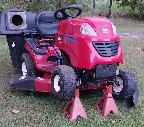
- Offline
- Moderator
-

- Give code definitions with numbers!
- Posts: 4967
- Thank you received: 1113
I haven't had to try it yet...
"Ground cannot be checked with a 10mm socket"
Please Log in or Create an account to join the conversation.
- Andy.MacFadyen
-

- Offline
- Moderator
-

- Posts: 3353
- Thank you received: 1037
Noah wrote: I read somewhere that pushing the pedal just off it's rest position and holding it there (with a broom stick and the driver's seat or something) will keep an open line from draining.
I haven't had to try it yet...
Yeah that works it only takes about 2 or 3 mm movement at the master cyclinder (probably translates to about 18mm/1.5" at the pedal) to close the inlet ports off but it is probably easier to prop the pedal all the way down.
This picture kind of explains whats going on
As they say on UK kids TV "Here is one I made ealier".
" We're trying to plug a hole in the universe, what are you doing ?. "
(Walter Bishop Fringe TV show)
Please Log in or Create an account to join the conversation.

